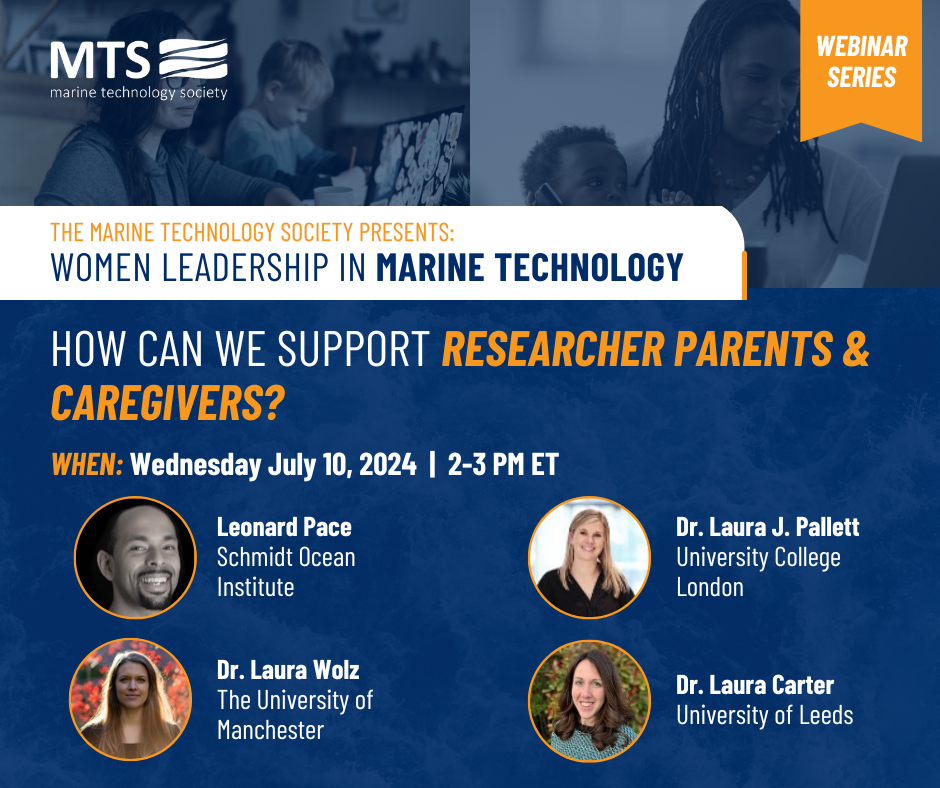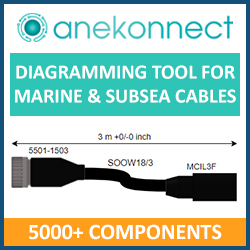|
MTS Women Leadership in Marine Science and Technology Webinar Series | How can we support researcher parents and caregivers?
Wednesday, July 10, 2024, 2:00 PM - 3:00 PM EDT
Category: Virtual Event
MTS Women Leadership in Marine Science and Technology Webinar Series: How can we support researcher parents and caregivers?

Description:
There are many factors affecting women’s ability to engage actively in collaborations, publishing and career advancement. This webinar will focus on inequitable impacts on women’s careers due to caring for children and other dependent care responsibilities and what can be done to affect positive change.
Date/Time:
Wednesday, July 10, 2024 | 2:00pm-3:00pm
Presenters:
Dr. Laura Carter, University of Leeds
Dr. Laura Carter is an environmental chemist and UKRI Future Leader Fellow at the University of Leeds. Dr. Carter leads a multidisciplinary research group who are working to understand the fate and effects of emerging contaminants inadvertently introduced into the environment following the reuse of wastewater and treated sludges. Research is underway to explore impacts on ecosystem and human health as well as understand the contribution the environment plays in the development of antimicrobial resistance. Dr. Carter works closely with stakeholders and has been appointed as a REACH challenge panel expert and a member of the Hazardous Substances Advisory Committee (HSAC) to advise Defra on how to protect the environment, and human health via then environment, from potentially hazardous substances.
Dr. Laura J. Pallett, University College London
Dr. Laura Pallett is an immunologist and UKRI Future Leader Fellow based at University College London (UCL). Research in the Pallett lab focusses on understanding how tissue-resident T cells and the underlying stomatal cells ‘co-operate and communicate’ to better understand chronic liver diseases. Specifically research is underway to understand how these ‘local intrahepatic cells’ interact in both the healthy and diseased human liver to inform the development of improved treatments for patients. Dr. Pallett is currently AthenaSWAN co-lead for her department, actively contributing to positive change to support the academic careers of women scientists. In a previous role, Dr. Pallett was an Early Career Representative of the learned society the British Society for Immunology’s ‘Members Forum’ (the BSI’s ‘ThinkTank’) where issues/ideas important to the sector/membership were raised, discussed and developed. Examples of topics we covered include academic bullying, “the leaky pipeline” and vaccine hesitancy.
Dr. Laura Wolz, The University of Manchester
Dr. Laura Wolz is an astrophysicist working on cosmology with radio surveys. As a UKRI Future Leader Fellow, Dr Wolz leads a research group at University of Manchester with particular focus on data from the SKA Observatory and its pathfinders. Dr. Wolz has an interest in the data reduction and calibration of time-ordered data to maps, as well as further processing to measure higher-order statistics from the maps. Previously, Dr. Wolz led the SKA Cosmology Science Working Group (2017-21, ~130 members) where she implemented important first EDIA policies, such as Code of Conduct and Terms of References incl. transparent leadership election process, now more widely adapted within the SKAO. Since 2023, Dr. Wolz is the EDIA lead of the Physics & Astronomy Department at Manchester, leading the Institute of Physics JUNO submission as well as overseeing all EDI initiatives.
Leonard Pace, Schimdt Ocean
Leonard Pace is an experienced marine biologist who manages Schmidt Ocean Institute’s project selection and related community coordination and outreach activities. He also manages special projects such as SOI's inclusivity program and liaising with the scientific community. Leonard’s work prior to joining the Schmidt Ocean Institute concentrated on supporting federal granting and environmental conservation. He worked with the National Science Foundation’s Division of Geoscience and coordinated grant competitions and managed budgets for the Integrated Ocean Drilling Program, as well as supporting Earthcube, the Ocean Acidification program, and numerous other initiatives. He managed activities for NOAA’s Aquatic Invasive Species program including annual grant competitions and external outreach. He worked for the U.S. Fish and Wildlife Service and NOAA in a joint Knauss Marine Policy Fellowship where he supported the U.S. Coral Reef Task Force in its efforts to preserve and protect coral reef habitats. He received his bachelor of science degree in Marine and Environmental Science from Hampton University and his master of science in Fisheries Biology from the Virginia Institute of Marine Science. His primary focus was on elasmobranch physiology and he also conducted research on Great White Shark ecology in South Africa and Naked Dragonfish respiration in Antarctica.
|


 Prev Month
Prev Month View Month
View Month Search
Search Go to Month
Go to Month Next Month
Next Month
 Export Event
Export Event 